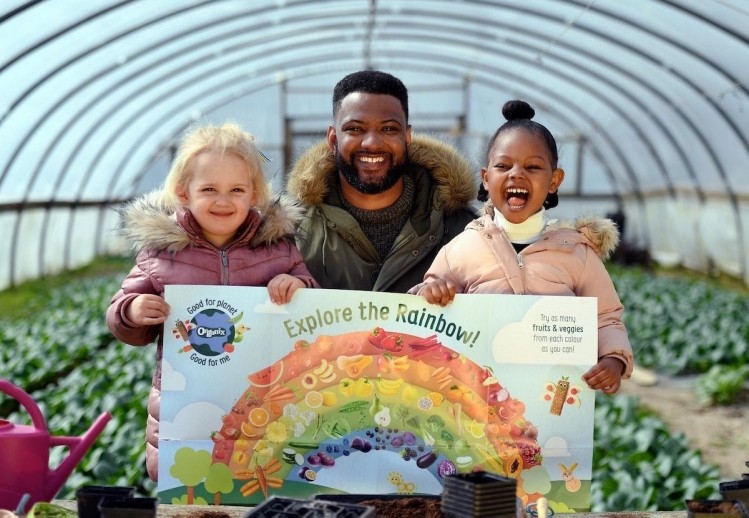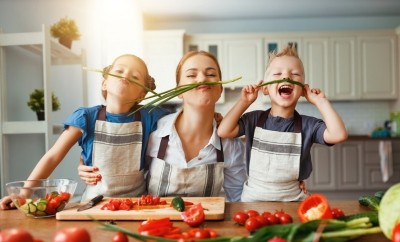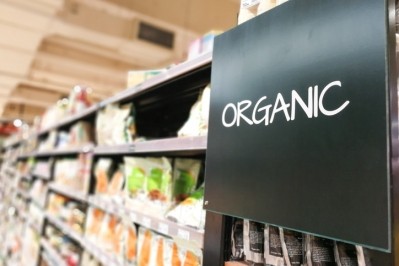Organix wants kids to eat more fruit and veg: ‘That means looking beyond our own product portfolio’

Organix’s new marketing campaign is somewhat out of left field in that the company isn’t trying to promote its own range of products targeting toddlers and early years. Instead, the ‘Good for planet. Good for me’ initiative hopes to get pre-schoolers eating just one more portion of fruit or vegetables per day.
“We are a business that really cares about the health and wellbeing of our little ones. That means looking beyond our own product portfolio and getting into the hearts and minds of carers and finding the best ways to support them overall,” Managing Director Mark Golder explained at the digital launch event.
“Campaigning has always been a huge part of who we are. From our inception nearly 30 years ago, we have been challenging the government and food industry to do the right thing for both parents and children. Our past research has led to high profile direct action, from Jamie’s School Dinner campaign, to getting blue Smarties made with Azo dye removed from packs.
“‘Good for planet. Good for me’ was born out of our mission to do better for future generations by supporting parents and caregivers to get little ones loving fruit and veg.”
Organix is working alongside the National Day Nursery Association to provide support and resources to early years educators working to get children accustomed to and excited about ‘exploring the rainbow’ of fruit and vegetable colours. When Organix approached NDNA, the tie-up was a ‘no brainer’, the association’s CEO Purnima Tanuku reflected.
“It’s important to have a healthy relationship with food [to support life-long health] and early years is really vital for this,” she stressed, praising the ‘colourful and engaging’ approach the initiative is taking.
The organic kids’ snack manufacturer has recruited JLS band member, turned farmer, JB Gill as brand ambassador for the outreach effort.
“As a father and a farmer, I also know how when you show kids and help them understand where food comes from, you’ll have much greater success in getting them to rethink their relationship with it. To that effect, we’ve created a wealth of amazing content to inspire parents, family members and nurseries,” Gill said.
Organix believes three key takeaways support fruit and veg consumption in pre-schoolers:
Take exploring new fruit and vegetables away from the dinner table and bring them into play
Visualisation is important to get your kids more comfortable with foods, without it ending up in the bin
Exploring foods is multi-sensory and allowing children them to discover through texture, sight and fun will yield better results
‘Millions of pre-school children don’t eat enough fruit and veg’
Organix’s campaign aims to combat a concerning trend highlighted in YouGov research commissioned by the company. “Millions of pre-school children don’t eat enough fruit and veg,” the company revealed.
The study found 55% of children aged four and under have two or fewer portions of vegetables a day - that’s 2 million children. One-fifth of UK pre-schoolers eat only one portion per day – while almost 116,000 infants were found to have ‘no vegetables at all in their daily diet’.
And it's not just about quantity. A lack of dietary variety is also a cause for concern. “Only six vegetables make a regular appearance on children’s plates,” observed Emily Day, Head of Food Development at Organix.
Organix didn’t just want to look at eating habits, as part of the research it also wanted to understand the areas where caregivers need more support. It discovered that one-in-four parents ‘feel guilty’ about their child’s daily diet, especially because COVID lockdowns were found to increase the amount of processed food young children are eating. “Despite trying lots of different techniques, parents worry about providing a lack of variety and not giving their children enough vegetables,” Organix revealed.
“Parents want their children to eat well… there is not enough information readily available,” Day contended.
Indeed, the survey revealed a quarter of all parents and guardians would like to increase the variety of foods in their children’s diets.
However, almost one in three parents said they would not persevere with a vegetable their child refused to eat for fear of upsetting them. Almost half admit to ‘giving up’ on introducing new foods after 6 attempts, despite the ‘average time’ it takes for children to take to a new food being between 11 - 15 times.
Meanwhile, over half of parents, 53%, also admitted to hiding vegetables in their children’s meals. This can actually hinder children’s uptake of fruit and veg in their diet because kids are more likely to accept foods that they are familiar with.
Key to winning over children and supporting healthy fruit and veg consumption is making it ‘fun and interesting’. Organix has also partnered with researchers at the University of Reading, who have developed ‘see and eat’ books to help children become accustomed to a wider variety of fruit and vegetables.
“As psychologists, we know that the more we look at something the more we like it. With this in mind, we wanted to investigate the role of visual familiarity. How looking at a vegetable alone can impact a child’s willingness to eat it," Dr. Natalie Masento, a psychologist in food, nutrition and health at Reading University, told listeners.
“We created a set of digital books known as the ‘See and Eat’ books and tested how this would change children’s behaviour towards vegetables… Our results showed just by looking at a picture book of a vegetable over a two week period not only made children more willing to try it, but actually tripled their intake. This effect was seen for several months – so it's not a short-lived effect it’s a long-term change.”
A high price for healthy foods?
Organix is a business that has been committed to organic standards for 30 years. Golder insisted that organic products are better for personal and planetary health. But, he continued, this campaign isn’t focused on getting people to switch to organic.
“We make all of our foods from 100% organic produce because that’s the absolute best for little ones’ tummies and the future of the environment and the future of the plant. But when it comes to what kids are eating, the priority here is to try and get one extra portion of fruit and vegetables into little ones’ tummies, whether it's organic or not.”
He agreed that the higher organic price point can be a barrier for some families. “We know that unfortunately organic can sometimes be a bit more expensive. One of the things we might point people towards and encourage them is to look up what’s referred to as the ‘dirty dozen’ a list that’s regularly updated by the Environmental Working Group, and it highlights which particular fruit and veg regularly contain higher levels of pesticides. The top three are often strawberries, kale and spinach.”
Organix’s Head of Food Development added that the campaign extends beyond fresh produce to include frozen or canned fruit and veg. “When we think about budgeting… it’s not just fresh fruit and veg that count, it’s also things like frozen or even tinned vegetables. If you are going to buy tinned, look out for veg in natural water without added salt and fruit… that isn’t in syrups. Another great tip if it’s not convenient to have fresh or money is a concern,” Day explained.
Indeed, Golder concluded, the real ambition of this drive is to support increased vegetable and fruit consumption and contribute to making these healthier choices ‘accessible for all’.
The campaign will be available to support parents through the Organix website and via a partnership with NDNA on their website, to over 300,000 nursery school children across the UK throughout May.

















